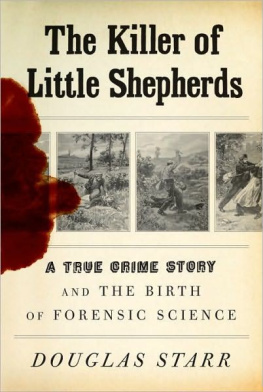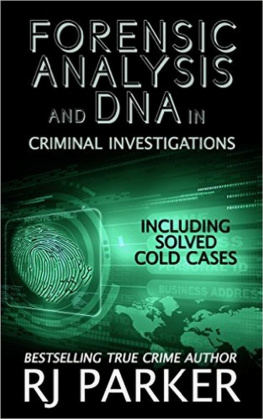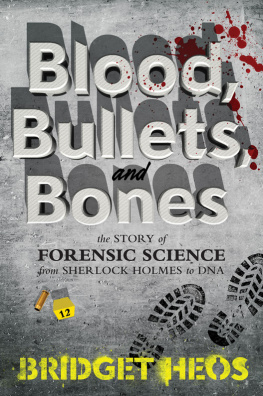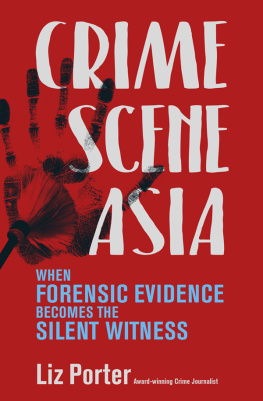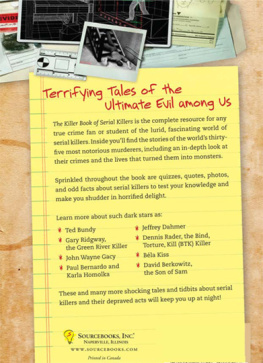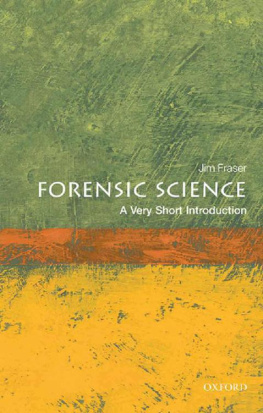ALSO BY DOUGLAS STARR
Blood:
An Epic History of Medicine and Commerce
THIS IS A BORZOI BOOK
PUBLISHED BY ALFRED A. KNOPF
Copyright 2010 by Douglas Starr
All rights reserved. Published in the United States by Alfred A. Knopf, a division of Random House, Inc., New York, and in Canada by Random House of Canada Limited, Toronto.
www.aaknopf.com
Knopf, Borzoi Books, and the colophon are registered trademarks of Random House, Inc.
Library of Congress Cataloging-in-Publication Data
Starr, Douglas P.
The killer of little shepherds : a true crime story and the birth of forensic science / Douglas Starr. 1st ed.
p. cm.
eISBN: 978-0-307-59458-7
1. Vacher, Joseph, 18691898.Trials, litigation, etc. 2. Trials (Murder)France. 3. Serial murderersFranceBiography. 4. Serial murdersFranceHistory19th century. 5. Forensic sciencesFranceHistory19th century. I. Title.
KJV131.V33S73 2010 364.15232092dc22 2010014930
v3.1
For my parents
The wild beast slumbers in us all. It is not always necessary to invoke insanity to explain its awakening. Dr. Edward Spitzka, 1901 postmortem report on Leon F. Czolgosz, assassin of President William McKinley
Contents
Authors Note
This book is a work of nonfiction. I have taken no liberties with facts or the context in which the events related in the book occurred. All quotes and dialogue were taken from the participants letters, books, affidavits, and court testimony, or from verifiable contemporary journalistic sources. In those instances where I attribute thoughts to someone, the thoughts appear in italic and are based on that persons writings or testimony. The serial killer Joseph Vachers state of mind was reflected in a surviving collection of his letters, in affidavits of contemporaries who encountered him, in records of the asylums in which he was confined, and in the reports of investigators and alienists who interviewed him. Details of his crimes were gleaned from original crime-scene analyses, autopsy reports, newspaper accounts, and the oral histories of the modern-day inhabitants of the villages he terrorized. Dr. Alexandre Lacassagnes personality and state of mind were revealed by his voluminous writings and scientific reports, the writings of his many colleagues and friends, and the stories and artifacts shared by his descendants.
Most of the source material is in late-nineteenth-century French. Sometimes I shortened sentences and simplified the language in order to make the quoted material accessible to modern readers. Although numerous people helped with translations, any oversimplifications that may have resulted are my own.
Part One
Crime
The werewolf of legends
Has now been surpassed Popular verse about Joseph Vacher, 1898
One
The Beast
On a drizzly spring evening in 1893, in the French provincial city of Besanon, nineteen-year-old Louise Barant was walking along the riverside promenade when she crossed paths with a man wearing the dress uniform of the French army. His name was Joseph Vacher (pronounced Vashay ). Ugly weather, isnt it? he said, and automatically she responded, For sure. Normally Barant, tall and wholesome-looking, with curly blond hair, would not have spoken to a stranger, especially one as brutish-looking as he; but Vacher projected a kind of disarming innocence, and the sergeants chevrons on his sleeve reassured her.
So they chatted and walked and shared dinner in a caf. They learned that they both came from small towns: she from Baume-les-Dames, a pretty village near the Swiss border, and he from Beaufort, a nondescript hill town southeast of Lyon. As they lingered over shared stories about their pasts, he told her he had never felt this comfortable with anyone, and she, too, sensed she could speak freely and easily. Yet she felt a shiver of doubt when she looked up from her meal and saw his eyes burning into her. Later that evening, he ardently proposed marriage. When he vowed that he would kill her if she ever betrayed him, she realized she had made a terrible mistake.
In the weeks that followed, he pursued her relentlessly. Like other men who live easily with violence, Vacher knew how to interweave threat, regret, self-pity, and charm in an attempt to prolong the relationship. Louise, who was a stranger to the town and worked as a housemaid, tried desperately to avoid him, inventing endless excuses for not being available. Once, taking pity as victims sometimes do, she agreed to meet him at a dance. They were standing awkwardly among the merrymakers when a soldier approached to talk to Louise. Vacher lunged at the man with such fury that the soldier and Louise ran from the dance hall.
Now she knew that she would never be safe in the same town as Vacher. Too afraid to reject him directly, she made up a story that her mother had forbidden their marriage and had ordered her home. The distance did nothing to quell his obsession. He kept mailing her love letters. Finally, she responded in the clearest possible way: It would be best if you stopped writing to me Everything is finished between us; I do not want to go against the wishes of my mother. Furthermore, I do not love you. Adieu, Louise.
She hoped that would finally end things between them. Besides, she knew that if he left his unit to find her, he would face charges of desertion. But her departure and final letter had sent him into such a series of rages that the regimental doctor diagnosed him as having nervous exhaustion and gave him a four-month medical leave. He immediately headed to Baume-les-Dames, stopping to buy a revolver along the way.
Any of the soldiers in Vachers barracks would have told Louise not to get involved with the twenty-three-year-old sergeant in the first place, for something wild and violent dwelled within him. They had witnessed his manias and explosive temper: How once, when a soldier lagged in formation, Vacher swiftly and without warning kicked him in the groin; or how, during alcohol-induced tantrums, he would hurl heavy wooden bureaus across the room, roar like an animal, and rip handfuls of hair out of his forearms. Another time, when he was passed over for promotion, he drank himself senseless, tore apart the barracks, and slashed with a razor at anyone who came near. He ended the episode by taking the blade to his own throat. After that incident, he was hospitalized and transferred to another company.
Yet at times, Vacher could appear deferential, and, when necessary, even charming. Undoubtedly, he behaved that way when he first met Louise, although under the stress of rejection the beast had reemerged.
Arriving in her village, he spent days trying to persuade her mother and family to accept him, only to succeed in frightening them as well. On the morning of June 25, 1893, he went to the house of Louises employer for a final confrontation before taking the train back to Besanon. Louise opened the door, recoiling when she saw him.
Why are you afraid, Louise?
Im not afraid, she said unconvincingly.
Look, I dont want to harm you. Ive come here peacefully to demand the things that you owe me.
He had become obsessed with reclaiming the letters and trinkets he had given her, and the money he had spent taking her to dinner. She gave him all that he demanded, but still he kept talking about needing more. As he rattled on about his various resentments, she furtively backed her way up the marble stairway. The more he spoke, the more agitated he became.
When I think that you dont want me, Louise We would have been so happy! Listen, you dont know what I am capable of doing. I have already told you and I repeat: Im crazy about you! Come away with me.
She told him that if he did not leave immediately, she would wake her boss, who would eject him. Vacher slipped his right hand into his pocket.
So you do not want to come with me, then?
Next page
